2019高考英语交际英语能力强化练习二及解析
- 格式:doc
- 大小:110.00 KB
- 文档页数:12
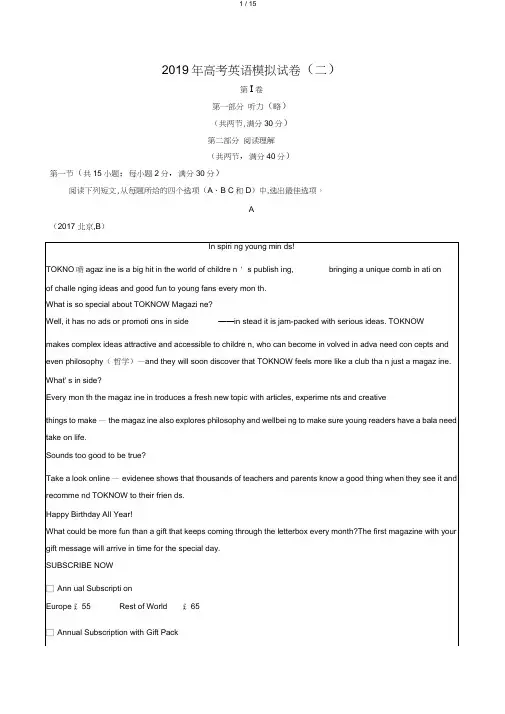
2019年高考英语模拟试卷(二)第I卷第一部分听力(略)(共两节,满分30分)第二部分阅读理解(共两节,满分40分)第一节(共15小题;每小题2分,满分30分)阅读下列短文,从每题所给的四个选项(A、B C和D)中,选出最佳选项。
A(2017 北京,B)Refund Policy ——the subscript on can be can celled with in 28 days and you can get your money back.21. Why is TOKNOW a special magaz in e?A. lt en terta ins young pare nts.B. It provides serious advertiseme nts.C. It publishes popular scie nee fictions.D. It comb ines fun with complex con cepts.22. What does TOKNOW offer its readers?A. On li ne courses.B. Articles on new topics.C. Lectures on a balaneed life.D. Reports on scientific discoveries.23. How much should you pay if you make a 12-month subscription to TOKNOW with gift pack fromChi na?A. £ 55.B. £60.C. £ 65.D. £ 70.24.Subscribers of TOKNOW would get ________ .A. free birthday prese ntsB. full refund within 28 daysC. membership of the TOKNOW clubD. cha nces to meet the experts in pers onB(2016 四川,B)If you could have one superpower, what would it be?Dream ing about whether you would want to read min ds, see through walls, or have superhuma n stre ngth may sound silly, but it actually gets to the heart of what really matters in __________________________________________ life.Every day in our work, we are in spired by the people we meet doing extraord inary thingsto improve the world.They have a differe nt kind of superpower that all of us possess: the power to make adiffere nee in the lives of others.We re n ot say ing that every one n eeds to con tribute their lives to the poor. Your livesare busy eno ugh doing homework, play ing sports, making frien ds, seek ing after your dreams.But we do think that you can live a more powerful life whe n you devote some of your time and energy to somethingmuch larger than yourself. Find an issue you are interested in and learn more. Volun teer or, if you can, con tribute a little money to a cause. Whatever you do, don ' tbe a bystander. Get involved. You may have the opportunity to make your biggest difference when you' re older. But why not start now?Our own experience working together on health, development, and energy the last twenty years has been one of the most rewarding parts of our lives. It has changed who we are and continues to fuel our optimism about how much the lives of the poorest people will improve in the years ahead.24. What does the underlined part in Paragraph 2 refer to?A. Your life style.B. Your life value.C. Your trouble in life.D. Your life experience.25. Why does the author say they are inspired every day?A. They possess different kinds of superpowers.B. They have got the power to change the world.C. Some people around them are making the world better.D. There are many powerful people in their life and work.26. What does the author stress in Paragraph 5?A. Learning more and contributing more to a cause.B. Rising above self and acting to help others.C. Working hard to get a bigger opportunity.D. Trying your best to help the poor.27. What can be inferred from the last paragraph?A. The author believes the lives of the poorest will get better.B. Much more progress will be made in the near future.C. The work on health is the most valuable experience.D. People 's efforts have been materially rewarded.C(2018课标全国I ,C)Languages have been coming and going for thousands of years, but in recent times there has been less coming and a lot more going. Whenthe world was still populated by hunter-gatherers, small, tightly knit(联系)groups developed their own patterns of speech independent of each other. Some language experts believe that 10,000 years ago, when the world had just five to ten million people, they spoke perhaps 12,000 languages between them.Soon afterwards, many of those people started settli ng dow n to become farmers, and theirIanguages too became more settled and fewer in number. In recent centuries, trade,industrialisation, the development of the nation-state and the spread of universal compulsory4/ 15educati on, especially globalisatio n and better com muni cati ons in the past few decades, allhave caused many Ian guages to disappear, and domin ant languages such as En glish, Spanish and Chin ese are in creas in gly tak ing over.At present, the world has about 6,800 Ianguages. The distribution of these Ianguages is hugely uneven. The general rule is that mild zones have relatively few Ianguages, often spoken by many people, while hot, wet zones have lots, often spoken by small numbers. Europe has only around 200 Ian guages;the Americas about 1,000;Africa 2,400;a nd Asia and the Pacific perhaps3,200, of which Papua New Guinea alone acco unts for well over 800. The media n nu mber( 中位数)of speakers is a mere 6,000, which means that half the world ' s Ianguages are spoken byfewer people tha n that.Already well over 400 of the total of 6,800 Ian guages are close to ext in cti on( 消亡),withonly a few elderly speakers left. Pick, at random, Busuu in Cameroon(eight remaining speakers), Chiapaneco in Mexico(150), Lipan Apache in the United States(two or three) or Wadjigu in Australia( one, with a questi on-mark): none of these seems to have much cha nee of survival.28. What can we infer about Ian guages in hun ter-gatherer times?A. They developed very fast.B. They were large in nu mber.C. They had similar patter ns.D. They were closely conn ected.29. Which of the following best explains “ dominant ” underlined in paragraph 2?A. Complex.B.Adva need.C. Powerful.D.Modern.30. How many Ian guages are spoke n by less tha n 6,000 people at prese nt?A. About 6,800.B.About 3,400.C.About 2,400.D.About 1,200.31. What is the main idea of the text?A. New Ian guages will be created.B. People ' s lifestyle s are reflected in Ianguages.C. Huma n developme nt results in fewer Ian guages.D. Geography determ ines Ian guage evoluti on.D(2018课标全国I ,D)We may think we ' re a culture that gets rid of our worn technology at the first sight of something shiny and new, but a new study shows that we keep using our old devices(装置) well after they go out of style. That 's bad news for the environment —and our wallets —as theseoutdated devices consume much more energy than the newer ones that do the same things.To figure out how much power these devices are using, Callie Babbitt and her colleagues at the Rochester Institute of Technology in New York tracked the environmental costs for each product throughout its life —from when its minerals are mined to when we stop using the device. This method provided a readout for how homeenergy use has evolved since the early 1990s. Devices were grouped by generation. Desktop computers, basic mobile phones, and box-set TVs defined 1992. Digital cameras arrived on the scene in 1997. And MP3 players, smartphones, and LCD TVs entered homes in 2002, before tablets and e-readers showed up in 2007.As we accumulated more devices, however, we didn 't throw out our old ones. “The living-room television is replaced and gets planted in the kids ' room, and s uddenly one day, you have a TV in every room of the house, ” said one researcher. The average number of electronic devices rose from four per household in 1992 to 13 in 2007. We' re not just keeping these old devices —we continue to use them. According to the analysis of Babbitt ' s team, old desktop monitors andbox TVs with cathode ray tubes are the worst devices with their energy consumption and contribution to greenhouse gas emissions(排放) more than doubling during the 1992 to 2007window.So what' s the soluti on(解决方案)?The team' s data only went up to 2007, but the researchers also explored what would happen if consumers replaced old products with new electronics that serve more than one function, such as a tablet for word processing and TV viewing. They found that more on-demand entertainment viewing on tablets instead of TVs and desktop computers could cut energy consumption by 44%.32. What does the author think of new devices?A. They are environment-friendly.B. They are no better than the old.C. They cost more to use at home.D. They go out of style quickly.33. Why did Babbitt ' s team conduct the research?A. To reduce the cost of minerals.B. To test the life cycle of a product.C. To update consumers on new technology.D. To find out electricity consumption of the devices.34. Which of the followi ng uses the least en ergy?A.The box-set TV.B.The tablet.C.The LCD TV.D.The desktop computer.35. What does the text suggest people do about old electr onic devices?A.Stop using them.B.Take them apart.C.Upgrade them.D.Recycle them.第二节(共5小题;每小题2分,满分10分)(2017课标全国川)根据短文内容,从短文后的选项中选出能填入空白处的最佳选项。

2019年高考英语全国二卷(精校+答案)预览说明:预览图片所展示的格式为文档的源格式展示,下载源文件没有水印,内容可编辑和复制2019年普通高等学校招生全国统一考试(全国卷II)英语注意事项:1.答卷前,考生务必将自己的姓名、准考证号填写在答题卡上。
2.回答选择题时,选出每小题答案后,用铅笔把答题卡上对应题目的答案标号涂黑。
如需改动,用橡皮擦干净后,再选涂其他答案标号。
回答非选择题时,将答案写在答题卡上,写在本试卷上无效。
3.考试结束后,将本试卷和答题卡一并交回。
第一部分听力(共两节,满分30分)做题时,先将答案标在试卷上。
录音内容结束后,你将有两分钟的时间将试卷上的答案转涂到答题卡上。
第一节 (共5小题;每小题分,满分分)听下面5段对话。
每段对话后有一个小题,从题中所给的A、B、C三个选项中选出最佳选项。
听完每段对话后,你都有10秒钟的时间来回答有关小题和阅读下一小题。
每段对话仅读一遍。
例:How much is the shirtA. £.B. £.C. £.答案是C。
1. Where does the conversation probably take placeA. In a library.B. In a bookstore.C. In a classroom.2. How does the woman feel nowA. Relaxed.B. Excited.C. Tired.3. How much will the man payA. $520.B. $80.C. $100.4. What does the man tell Jane to doA. Postpone his appointment.B. Meet Mr. Douglas.C. Return at 3 o’clock.5. Why would David quit his jobA. To go back to school.B. To start his own firm.C. To work for his friend.第二节(共15小题;每小题分,满分分)听下面5段对话或独白。
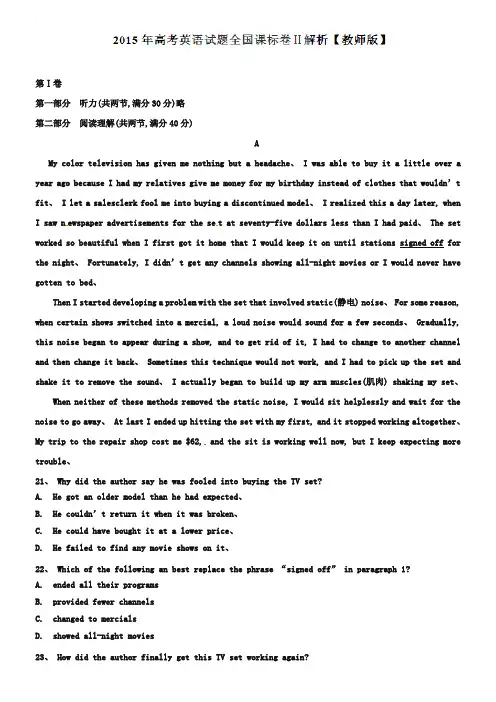
第Ⅰ卷第一部分听力(共两节,满分30分)略第二部分阅读理解(共两节,满分40分)AMy color television has given me nothing but a headache、 I was able to buy it a little over a year ago because I had my relatives give me money for my birthday instead of clothes that wouldn’t fit、 I let a salesclerk fool me into buying a discontinued model、 I realized this a day later, when I saw n ewspaper advertisements for the se t at seventy-five dollars less than I had paid、 The set worked so beautiful when I first got it home that I would keep it on until stations signed off for the night、Fortunately, I didn’t get any chann els showing all-night movies or I would never have gotten to bed、Then I started developing a problem with the set that involved static(静电) noise、 For some reason, when certain shows switched into a mercial, a loud noise would sound for a few seconds、 Gradually, this noise began to appear during a show, and to get rid of it, I had to change to another channel and then change it back、 Sometimes this technique would not work, and I had to pick up the set and shake it to remove the sound、 I actually began to build up my arm muscles(肌肉) shaking my set、When neither of these methods removed the static noise, I would sit helplessly and wait for the noise to go away、 At last I ended up hitting the set with my first, and it stopped working altogether、My trip to the repair shop cost me $62, and the sit is working well now, but I keep expecting more trouble、21、 Why did the author say he was fooled into buying the TV set?A.He got an older model than he had expected、B.He couldn’t return it when it was broken、C.He could have bought it at a lower price、D.He failed to find any movie shows on it、22、Which of the following an best replace the phrase “signed off” in paragraph 1?A.ended all their programsB.provided fewer channelsC.changed to mercialsD.showed all-night movies23、 How did the author finally get this TV set working again?A.By shaking and hitting itB.By turning it on and offC.By switching channelsD.By having it repaired24、 How does the author sound when telling the story?A.CuriousB.AnxiousC.CautiousD.Humorous【答案】21、 C22、 A[:23、 D24、 D22、A 词义推测题。
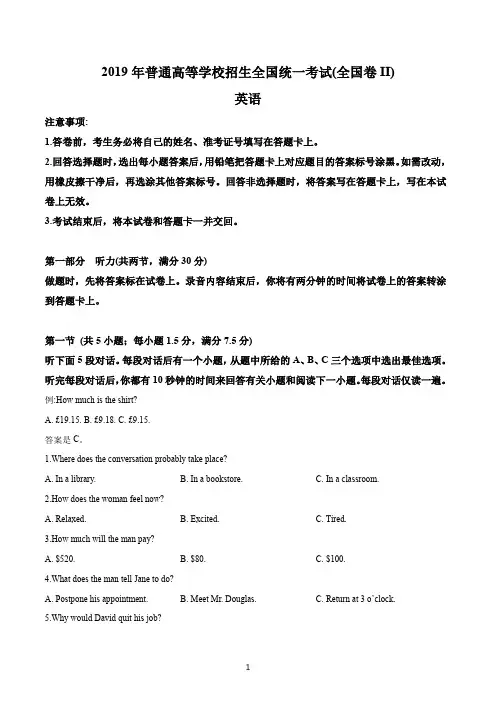
2019年普通高等学校招生全国统一考试(全国卷II)英语注意事项:1.答卷前,考生务必将自己的姓名、准考证号填写在答题卡上。
2.回答选择题时,选出每小题答案后,用铅笔把答题卡上对应题目的答案标号涂黑。
如需改动,用橡皮擦干净后,再选涂其他答案标号。
回答非选择题时,将答案写在答题卡上,写在本试卷上无效。
3.考试结束后,将本试卷和答题卡一并交回。
第一部分听力(共两节,满分30分)做题时,先将答案标在试卷上。
录音内容结束后,你将有两分钟的时间将试卷上的答案转涂到答题卡上。
第一节(共5小题;每小题1.5分,满分7.5分)听下面5段对话。
每段对话后有一个小题,从题中所给的A、B、C三个选项中选出最佳选项。
听完每段对话后,你都有10秒钟的时间来回答有关小题和阅读下一小题。
每段对话仅读一遍。
例:How much is the shirt?A. £19.15.B. £9.18.C. £9.15.答案是C。
1.Where does the conversation probably take place?A. In a library.B. In a bookstore.C. In a classroom.2.How does the woman feel now?A. Relaxed.B. Excited.C. Tired.3.How much will the man pay?A. $520.B. $80.C. $100.4.What does the man tell Jane to do?A. Postpone his appointment.B. Meet Mr. Douglas.C. Return at 3 o’clock.5.Why would David quit his job?A. To go back to school.B. To start his own firm.C. To work for his friend.第二节(共15小题;每小题1.5分,满分22.5分)听下面5段对话或独白。
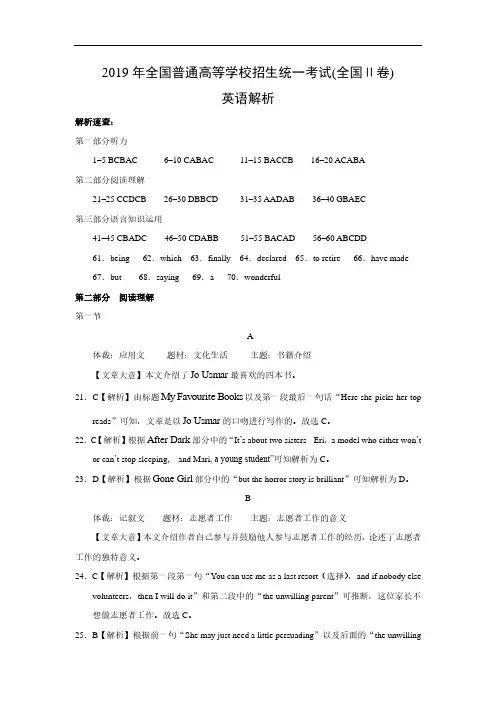
2019年全国普通高等学校招生统一考试(全国Ⅱ卷)英语解析解析速查:第一部分听力1–5 BCBAC 6–10 CABAC 11–15 BACCB 16–20 ACABA第二部分阅读理解21–25 CCDCB 26–30 DBBCD 31–35 AADAB 36–40 GBAEC第三部分语言知识运用41–45 CBADC 46–50 CDABB 51–55 BACAD 56–60 ABCDD61.being 62.which 63.finally 64.declared 65.to retire 66.have made 67.but 68.saying 69.a 70.wonderful第二部分阅读理解第一节A体裁:应用文题材:文化生活主题:书籍介绍【文章大意】本文介绍了Jo Usmar最喜欢的四本书。
21.C【解析】由标题My Favourite Books以及第一段最后一句话“Here she picks her top reads”可知,文章是以Jo Usmar的口吻进行写作的。
故选C。
22.C【解析】根据After Dark部分中的“It’s about two sisters - Eri,a model who either won’t or can’t stop sleeping, and Mari, a young student”可知解析为C。
23.D【解析】根据Gone Girl部分中的“but the horror story is brilliant”可知解析为D。
B体裁:记叙文题材:志愿者工作主题:志愿者工作的意义【文章大意】本文介绍作者自己参与并鼓励他人参与志愿者工作的经历,论述了志愿者工作的独特意义。
24.C【解析】根据第一段第一句“You can use me as a last resort(选择),and if nobody else volunteers,then I will do it”和第二段中的“the unwilling parent”可推断,这位家长不想做志愿者工作。
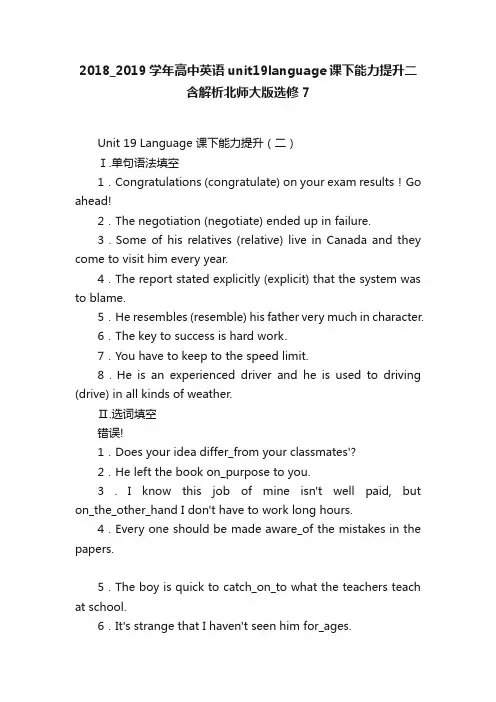
2018_2019学年高中英语unit19language课下能力提升二含解析北师大版选修7Unit 19 Language 课下能力提升(二)Ⅰ.单句语法填空1.Congratulations (congratulate) on your exam results!Go ahead!2.The negotiation (negotiate) ended up in failure.3.Some of his relatives (relative) live in Canada and they come to visit him every year.4.The report stated explicitly (explicit) that the system was to blame.5.He resembles (resemble) his father very much in character.6.The key to success is hard work.7.You have to keep to the speed limit.8.He is an experienced driver and he is used to driving (drive) in all kinds of weather.Ⅱ.选词填空错误!1.Does your idea differ_from your classmates'?2.He left the book on_purpose to you.3.I know this job of mine isn't well paid, but on_the_other_hand I don't have to work long hours.4.Every one should be made aware_of the mistakes in the papers.5.The boy is quick to catch_on_to what the teachers teach at school.6.It's strange that I haven't seen him for_ages.Ⅲ.翻译句子1.你越努力,取得的进步越大。
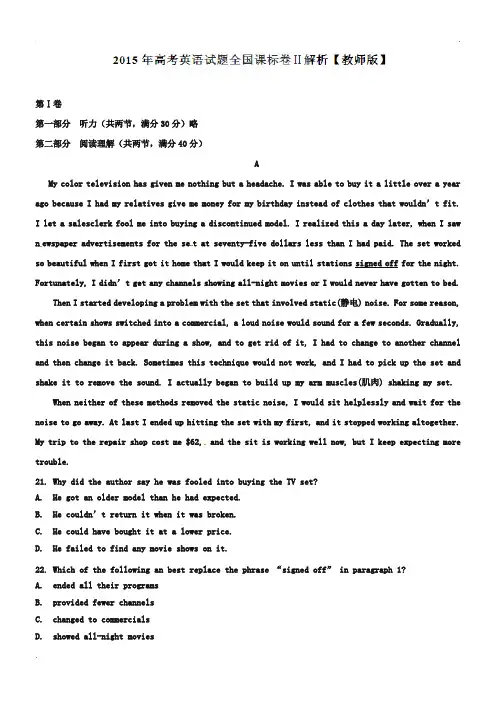
第Ⅰ卷第一部分听力(共两节,满分30分)略第二部分阅读理解(共两节,满分40分)AMy color television has given me nothing but a headache. I was able to buy it a little over a year ago because I had my relatives give me money for my birthday instea d of clothes that wouldn’t fit.I let a salesclerk fool me into buying a discontinued model. I realized this a day later, when I saw n ewspaper advertisements for the se t at seventy-five dollars less than I had paid. The set worked so beautiful when I first got it home that I would keep it on until stations signed off for the night. Fortunately, I didn’t get any channels showing all-night movies or I would never have gotten to bed.Then I started developing a problem with the set that involved static(静电) noise. For some reason, when certain shows switched into a commercial, a loud noise would sound for a few seconds. Gradually, this noise began to appear during a show, and to get rid of it, I had to change to another channel and then change it back. Sometimes this technique would not work, and I had to pick up the set and shake it to remove the sound. I actually began to build up my arm muscles(肌肉) shaking my set.When neither of these methods removed the static noise, I would sit helplessly and wait for the noise to go away. At last I ended up hitting the set with my first, and it stopped working altogether. My trip to the repair shop cost me $62, and the sit is working well now, but I keep expecting more trouble.21. Why did the author say he was fooled into buying the TV set?A.He got an older model than he had expected.B.He couldn’t return it when it was broken.C.He could have bought it at a lower price.D.He failed to find any movie shows on it.22. Which of the following an best replace the phrase “signed off” in paragraph 1?A.ended all their programsB.provided fewer channelsC.changed to commercialsD.showed all-night movies23. How did the author finally get this TV set working again?A.By shaking and hitting itB.By turning it on and offC.By switching channelsD.By having it repaired24. How does the author sound when telling the story?A.CuriousB.AnxiousC.CautiousD.Humorous【答案】21. C22. A[:23. D24. D22.A 词义推测题。
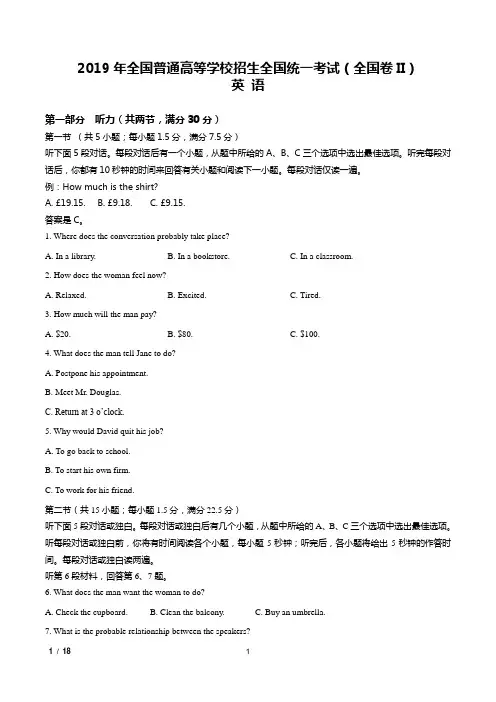
2019年全国普通高等学校招生全国统一考试(全国卷II)英语第一部分听力(共两节,满分30分)第一节(共5小题;每小题1.5分,满分7.5分)听下面5段对话。
每段对话后有一个小题,从题中所给的A、B、C三个选项中选出最佳选项。
听完每段对话后,你都有10秒钟的时间来回答有关小题和阅读下一小题。
每段对话仅读一遍。
例:How much is the shirt?A. £19.15.B. £9.18.C. £9.15.答案是C。
1. Where does the conversation probably take place?A. In a library.B. In a bookstore.C. In a classroom.2. How does the woman feel now?A. Relaxed.B. Excited.C. Tired.3. How much will the man pay?A. $20.B. $80.C. $100.4. What does the man tell Jane to do?A. Postpone his appointment.B. Meet Mr. Douglas.C. Return at 3 o’clock.5. Why would David quit his job?A. To go back to school.B. To start his own firm.C. To work for his friend.第二节(共15小题;每小题1.5分,满分22.5分)听下面5段对话或独白。
每段对话或独白后有几个小题,从题中所给的A、B、C三个选项中选出最佳选项。
听每段对话或独白前,你将有时间阅读各个小题,每小题5秒钟;听完后,各小题将给出5秒钟的作答时间。
每段对话或独白读两遍。
听第6段材料,回答第6、7题。
6. What does the man want the woman to do?A. Check the cupboard.B. Clean the balcony.C. Buy an umbrella.7. What is the probable relationship between the speakers?A. Husband and wife.B. Employer and employee.C. Shop assistant and customer.听第7段材料,回答第8至10题。
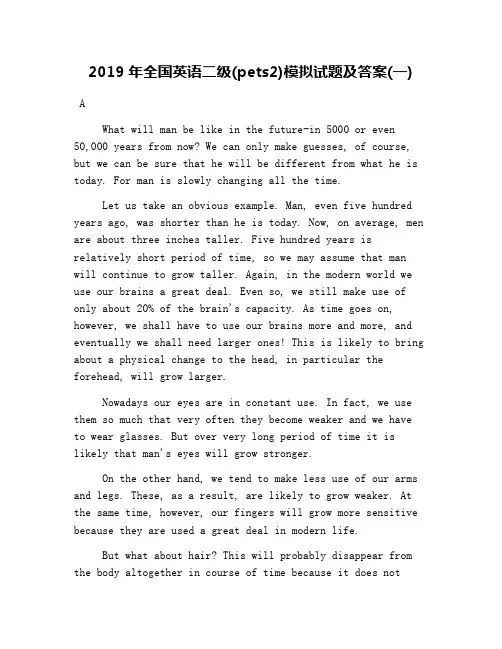
2019年全国英语二级(pets2)模拟试题及答案(一) AWhat will man be like in the future-in 5000 or even50,000 years from now? We can only make guesses, of course, but we can be sure that he will be different from what he is today. For man is slowly changing all the time.Let us take an obvious example. Man, even five hundred years ago, was shorter than he is today. Now, on average, men are about three inches taller. Five hundred years isrelatively short period of time, so we may assume that man will continue to grow taller. Again, in the modern world we use our brains a great deal. Even so, we still make use of only about 20% of the brain's capacity. As time goes on, however, we shall have to use our brains more and more, and eventually we shall need larger ones! This is likely to bring about a physical change to the head, in particular the forehead, will grow larger.Nowadays our eyes are in constant use. In fact, we use them so much that very often they become weaker and we have to wear glasses. But over very long period of time it is likely that man's eyes will grow stronger.On the other hand, we tend to make less use of our arms and legs. These, as a result, are likely to grow weaker. At the same time, however, our fingers will grow more sensitive because they are used a great deal in modern life.But what about hair? This will probably disappear from the body altogether in course of time because it does notserve a useful purpose any longer. In the future, then, both sexes are likely to be bald.Perhaps all this gives the impression that future man will not be a very attractive creature to look at! This may well be true. All the same, in spite of all these changes, future man will still have a lot in common with use. He will still be a human being, with thoughts and emotions similar to our own.36. The passage mainly tells us that____.A. man's life will be different in the futureB. future man will look quite different from usC. man is growing taller and uglier as time passesD. man's organs' functions will be one the wane37. What serves as the evidence that man is changing?A. Man has got stronger eyes now than he ever had.B. Man's hair is getting thinner and thinner.C. Man's arms and legs have become lighter and weaker.D. Man has been growing taller over the past 500 years.38. The change in man's size of forehead is probably because____A. he makes use only 20 % of the brain's capacity.B. his brain has grown larger over the past centuries.C. the other 80% of his brain will grow in due time.D. he will use his brain more and more as time goes on.39. What is true about a human being in the future?A. He is hairless because hair is no longer useful.B. He has smaller eyes and wears better glasses.C. His fingers grow weaker because he doesn't have to make use of them.D. He thinks and feels in different way.40. It is implied that ____.A. human beings will become less attractive in the future.B. less use of a bodily organ may lead to its degenerationC. human beings hope for a change in the future lifeD. future life is always predictable.BWith the steady increase in the amount of leisure time that people enjoy today, the importance of businesses that deal with leisure products and services is also steadily increasing. One of the biggest such industries is the tourist industry. Providing transportation and accommodations for tourists —— and guides, brochures, souvenirs —— is one of the major industries in many countries. Since people are now having longer vacations and are more and more interested in seeing other parts of the world, this business will no doubt continue to grow. Another industry obviously devoted to。
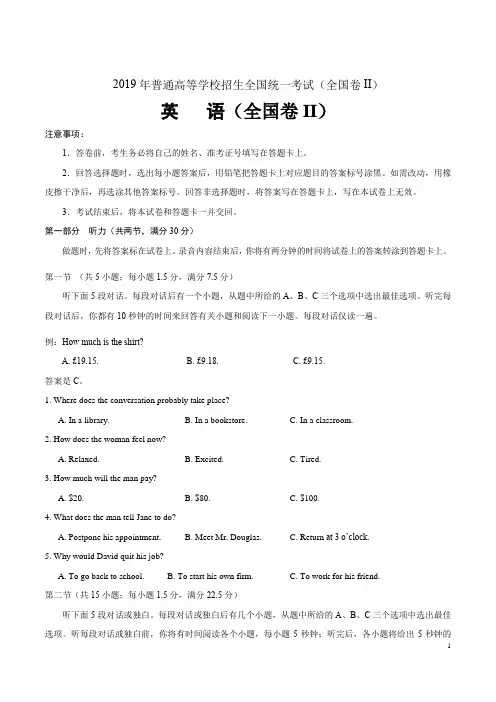
2019年普通高等学校招生全国统一考试(全国卷II)英语(全国卷II)注意事项:1.答卷前,考生务必将自己的姓名、准考证号填写在答题卡上。
2.回答选择题时,选出每小题答案后,用铅笔把答题卡上对应题目的答案标号涂黑。
如需改动,用橡皮擦干净后,再选涂其他答案标号。
回答非选择题时,将答案写在答题卡上,写在本试卷上无效。
3.考试结束后,将本试卷和答题卡一并交回。
第一部分听力(共两节,满分30分)做题时,先将答案标在试卷上。
录音内容结束后,你将有两分钟的时间将试卷上的答案转涂到答题卡上。
第一节(共5小题;每小题1.5分,满分7.5分)听下面5段对话。
每段对话后有一个小题,从题中所给的A、B、C三个选项中选出最佳选项。
听完每段对话后,你都有10秒钟的时间来回答有关小题和阅读下一小题。
每段对话仅读一遍。
例:How much is the shirt?A. £19.15.B. £9.18.C. £9.15.答案是C。
1. Where does the conversation probably take place?A. In a library.B. In a bookstore.C. In a classroom.2. How does the woman feel now?A. Relaxed.B. Excited.C. Tired.3. How much will the man pay?A. $20.B. $80.C. $100.4. What does the man tell Jane to do?A. Postpone his appointment.B. Meet Mr. Douglas.C. Return at 3 o’clock.5. Why would David quit his job?A. To go back to school.B. To start his own firm.C. To work for his friend.第二节(共15小题;每小题1.5分,满分22.5分)听下面5段对话或独白。
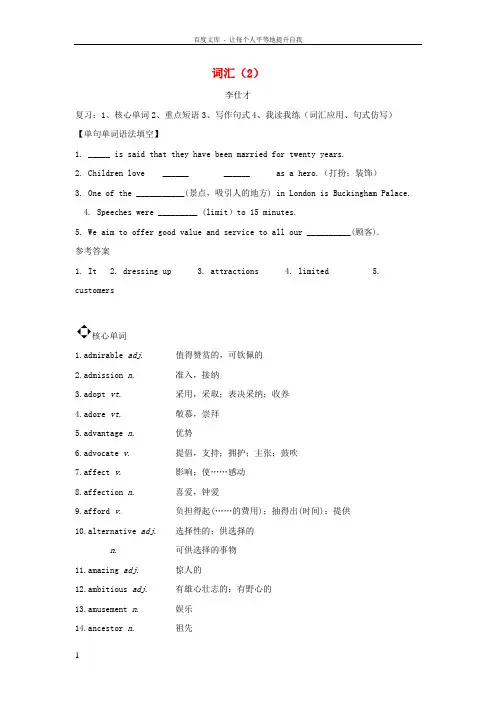
词汇(2)李仕才复习:1、核心单词2、重点短语3、写作句式4、我读我练(词汇应用、句式仿写)【单句单词语法填空】1. _____ is said that they have been married for twenty years.2. Children love ______ ______ as a hero.(打扮;装饰)3. One of the ___________(景点,吸引人的地方) in London is Buckingham Palace.4. Speeches were _________ (limit)to 15 minutes.5. We aim to offer good value and service to all our __________(顾客).参考答案1. It2. dressing up3. attractions4. limited5. customers核心单词1.admirable adj. 值得赞赏的,可钦佩的2.admission n. 准入,接纳3.adopt vt. 采用,采取;表决采纳;收养4.adore vt. 敬慕,崇拜5.advantage n. 优势6.advocate v. 提倡,支持;拥护;主张;鼓吹7.affect v. 影响;使……感动8.affection n. 喜爱,钟爱9.afford v. 负担得起(……的费用);抽得出(时间);提供10.alternative adj. 选择性的;供选择的n. 可供选择的事物11.amazing adj. 惊人的12.ambitious adj. 有雄心壮志的;有野心的13.amusement n. 娱乐14.ancestor n. 祖先15.ancient adj. 古老的16.anniversary n. 周年纪念(日)17.announcement n. 通告,通知18.anxious adj. 忧虑的,焦急的19.apologize vi. 道歉,谢罪20.appetite n. 食欲,胃口21.applaud v. 鼓掌;赞许,赞赏22.applicant n. 申请者,申请人23.appreciate v. 欣赏;感激24.approach v. 接近,靠近n. 方法;路径;接近,靠近25.appropriate adj. 合适的,恰当的重点短语1.account for 对……作出解释;是……的原因;占……on no account 绝不(置于句首时,句子用部分倒装)on account of 因为take sth into account/consideration考虑到;顾及;体谅……2.add...to... 把……加到……add to 增加(常用于抽象意义)add up 加起来add up to 总计3.apart from 除……以外(还)aside from 除……以外(还)far from 远离,远非regardless of 不管,不顾【阅读理解】My daughter Kelly is a cautious person. She needs to warm up situations, and is hesitant to try new things. When with close friends, she becomes a leader who laughsloudly and chants. “Girls rule, boys drool.” But when that comfort zone is not around her, she is shy and nervous.This has been challenging for me at times. “Shy” is not a word that I think has ever been used to describe me. But this has been year of firsts for my girl that has filled her with a new sense of confidence. This year she moved to lap lane in swimming where she was preparing for a swim team. This year she learned to ride a bike without training wheels. And this year she completed her first kids’ triathlon(三项全能).On Saturday, with a thunderstorm coming soon and my son’s birthday party later in the day, we all went out in the dark of the morning for Kelly to participate in her first triathlon. We practiced transitions from swim to bike to run with her, we got all the equipment she’d need, and we kept talking about the race. But as we waited the two hours for the older kids to finish before her turn, she held my leg a little harder and told me she loved me a few too many times. She was nervous but trying to keep it together.And then it was her turn. From the second she jumped into the water, my heart soared. My daughter transformed into the most confident human being I had ever seen. She dominated that swim, crushed that bike ride and ran to the finish with the biggest smile on her face.I can honestly say that I never felt so proud of someone in my entire life. It wasn’t because she did a sport or anything like that. It was because she was afraid of something and conquered that fear with confidence and a fire I hadn’t seen before.All day I would find myself just looking over at her and smiling. She might be wearing the finalist medal but I felt like I won that day. I won the chance to see my girl shine.Shine on, sweet baby.1.Kelly is nervous when ________.A. boys are around herB. she changes into a leaderC. she is away from her momD. situations are new to her2.We can learn from Paragraph 3 that______.A. the race began in the early morningB. Kelly was eager for her turn in the raceC. the whole family gave Kelly supportD. her brother’s birthday party was delayed.3.In the ending paragraphs the author “felt like I won that day” becauseKelly________.A. Took part in the sportB. Expressed love to herC. Won the gold medalD. Changed completely4.What kind of person do you think Kelly is?A. Timid and determinedB. Cute and confidentC. Fearful and energeticD. Sociable and brave【文章大意】本文讲述了“我”的女儿Kelly是个慢热型的人,和陌生人在一起她会很紧张很害羞,看到女儿赢得奖牌是作为父母最大的荣耀。
2019 年普通高等学校招生全国统一考试广东省英语模拟试卷 (二)本试卷分第Ⅰ卷 (选择题 ) 和第Ⅱ卷 (非选择题 )两部分。
全卷满分120 分 , 考试用时120 分钟。
注意事项 :1.因本试卷不考听力 , 第Ⅰ卷从第二部分的“阅读理解”开始 , 试题序号从“ 21”开始。
2.答卷前 , 考生须认真核对条形码上的姓名、考生号、考场号和座位号,并将其贴在指定位置, 然后用0.5 毫米黑色字迹签字笔将自己所在的县( 市、区) 、学校以及自己的姓名、考生号、考场号和座位号填写在答题卡和试卷的指定位置, 并用2B 铅笔在答题卡的“考生号”处填涂考生号。
3. 回答选择题时 ,选出每小题答案后,用2B铅笔把答题卡上对应题目的答案标号涂黑回答非选择题时,将答案写在答题卡上,写在本试卷上无效。
;4.考试结束后 , 将本试卷和答题卡一并交回。
第二部分第一节 (共阅读理解15 小题 ;(共两节,满分40分)每小题 2 分,满分30 分 )阅读下列短文,从每题所给的 A 、 B、 C和 D四个选项中,选出最佳选项,并在答题卡上将该项涂黑。
AYou may have your favorite family spots on Long Island where you frequently take the kids. But there may be unexpected places you haven't explored yet.American Air power MuseumA nonprofit organization, AAM's mission is to preserve the legacy( 遗产 )of all Americans who sacrificed themselves to defend our liberties. They seek educate new generations about their courage, bravery and heroism by presenting aircraft and armor( 盔甲 )in tire museum through displays, exhibits and programs.Telephone: 020 7841 3600Cradle of Aviation MuseumThe Cradle of Aviation Museum features more than 75 planes and spacecraft, a dozen cockpits and 30 hands- on exhibits in nine galleries. A favorite among kids is the SesameStreet show featuring Big Bird, Elmo and more as they learn about the Big Dipper, the NorthStar the sun and the moon.Telephone: 020 7414 3428Tackapausha MuseumHead to Tackapausha Museum in Seafaford and get in touch with nature. Each month,the museum has scheduled presentations and live exhibits featuring preying birds, reptiles ,amphibians and new Egyptian fruit bats. The museum also offers environmental education programs and opportunities to get involved in community service projects.Telephone: 020 7967 1066Long Island Children's MuseumParents looking for educational fun can head to the Long Island Children's Museum. At the Bricks &. Sticks exhibit, kids can build and discover more about our 3-D world through playing with blocks and interactive software. At Climb It, kids can play all day in a two-story climbing structure. The Communication Station will allow kids to learn all about every different aspect of communication from how news is broadcast to how their favorite cartoon characters are created. The most popular exhibit is the large bubble ( 泡泡 ) area where kids can blow bubbles and even step inside one giant bubble.Telephone: 020 7405 21273.Which museum offers a chance to appreciate the diversity of wildlife?American Air power MuseumCradle of Aviation Museum.Tackapausha Museum.Long Island Children' Museum.4.Whet is an astronaut lover likely to call for further information?A.020 7841 3600.B.020 7414 3428.C.020 7967 1066.D.020 7405 2127.5.What can the kids do at the Long Island Children's Museum?Test out a 3-D printer.Blow colorful bubbles.Play with blocks at virtual reality.Be dressed up as cartoon characters.BRachel Harrington wants her children to have nutritious packed lunches enjoy at school, but she gets discouraged Trying tn create them."Making lunches for my kids is one of my least leastfavorite activities. I’ d like to do it the night before but that never happens," said the mother of two "There are a lot complaint "It's hard work. She's happy to outsoure ( 外包 ) two days a week to abusiness“ Having two days off is like a dream," she said.“ Sometimes I forgot that it was a RedFamilies around the country are finding new options for their children's lunches, thanks to agrowing number of delivery options meeting the demands of students. Some deliver to the schools,others to homes. As for teens calling in their own food deliveries, some schools allow it and othersdon't. Lisa Farrell launched Red Apple Lunch after market research proved her doubt that lunchpacking was a “ stress point " for parents. “ You only have so much time in the day," she said. customersdidn't like what was offered at the school. Folks just needed anoth er option. ” She andher team pack healthy lunches, combining local food when possible and deliver them to homes sothat kids can take them to school the next two days The company delivers two lunches onMonday and two on Wednesday.When Spencer Wood's daughter forgot her lunch last spring he arrange a 1ot red AppleLunch to deliver her a meal.“ I called the school to make sure,itandwastheyOKsaid families doit all the time," said Mr Wood, of Canal Winchester,Ohio. "They were very he driver." His 12-year-old helpful, telling me when to have it sent and reminding me to tip the he said.daughter,Madison, loved the special delivery of macaroni and cheese.24.What does Rachel Harrington think of making lunches for her kids:A.Enjoyable.B.Tiring.C.Meaningful.D.Scaring.25.Why did the Red Apple Lunch come into existence?A.To enrich food diversities in school.B.To offer healthier lunches to students.C.To develop a new program for its company.D.To ease the stress of preparing lunches on parents.26.Which of the following best describe Lisa Farrell?A.Experienced and helpful.B.Generous and adventurous.C.Practical and sharp minded.D.Enthusiastic and warm-hearted.5.What can be the best title of the text?Advantages of School Lunch PackingThe Change for the School CafeteriaAn Alternative to the School Lunch PackingThe Founding of Red Apple Lunch CompanyCThe Mona Lisa effect describes the phenomenon where the eyes in a portrait seem to followthe person looking at it, no matter where the person stands in the room. The effect was obviouslynamed after Leonardo da Vinci s famous painting featuring the woman with the mysterious smileand the steady stare. But ironically ( 讽刺地 ), a new study/ finds that Mona Lisa may not be allthat interested in tracking her observers. Two researchers from Bielefeld University in Germanyfound that the famous subject of the painting, also known, as "La Gioconda" , is actually lookingjust over your right shoulder.For the experiment , Horstmann and his research assistant Sebastian Loth gathered twodozen participants to take a look at the eyes of the painting. But they didn't just ask them if theythought Mona Lisa was looking their way. Instead they displayed part of her face on a computerscreen, then asked volunteers to measure her stare using a carpenter's ruler that was heldhorizontally between them and the screen.Although the computer screen and the participants stayed in the same spot, the ruler wasmoved closer and farther from the screen during the trial. In addition, the researchers modifiedthe size of Mona Lisa 's face and how much of her features were visible to see if that changed the perception of her stare. I he images showed varying degrees of rise 一 from 30 to70 percent withsome showing her entire face and others showing just her eyes and nose.The researchers also moved the images several centimeters to the left and to the right, so the Participants wouldn’icktjustthepsame measurement on the ruler each time.Horstmann and Loth published their results in the journal i-perception where they were veryclear in their conclusion.“ We conclude from the measurements that the; lack of evidences due tothe declaration being objectively false: Mona Lisa does not stare at the viewer , ” they wrote. “ There is no doubt about the existence of the Mona Lisa effect---it just does not occur withMona Lisa herself.6.What does the new study find?The Mona Lisa effect does exist.The reason for Mona Lisa smile.What is the origin of the real Mona Lisa.Mona Lisa is not Straightly looking at the viewer.6.What were the participants required to do during the experiment?To operate a computer as they moved.To measure the direction of the stare with a ruler.To count the direction of the stare with a computer.To evaluate the distance between each participant.30. Which can best replace the underlined word“ "modified 3? ”in paragraphA. Estimated.B. Changed.C. Enlarged.D. Described.7.What do Horstmann and Loth think of the new finding?It's reasonable and clear.It's beyond expectation.It's short of solid evidence.It's consistent with previous studies.DWe have all been there. In a rush to leave the house we grab ou phone6 a head out of the door, realizing all too late that the battery is dead because we forgot 1oprog it into the table cloth. Or perhaps we have not. But this could be be future that scientists hope to explore with eletr6nic sheets that charge our Mobile phones, laptops and other equipment by harvesting energy fromthe world around us.In a step in that direction, scientists at Massachusetts Institute of Technology ( MIT)have created super- thin,bendy materials that absorb wireless Internet and other electromagnetic waves in the air and turn them into electricity. The lead researcher, Tomas Palacios, said the breakthrough smoothed the way for energy- harvesting covers ranging from table cloths to giant packing for buildings that catch energy from the environment to power sensors and other electronics.半Palacios and his colleagues connected a bendy antenna(天线 )to a flexiblesemiconductor( 导体 )layer only three atoms thick. The antenna picks up wifi and other radio frequency signals and turns them into a current. This flows into a special semiconductor, whereit is changed into a direct electrical current. Researchers have made energy-harvesting“ rectennas ( rectifying antenna ) ” before,but existing equipment is made from conventional semiconductors which are inflexible, fragile and practically impossible to make in large sheets.The wi-fi signals can fill an office with more than 100 microwatts of power that is ripe to be collected by energy-harvesting equipment. The MIT system has an efficiency ( 效率 ) of between 30% and 40% ,producing about 40 microwatts when exposed to signals bearing 150microwatts ofpower in laboratory tests.“ It doesn't. sound like much compared withattsthethat60wa computerneeds, but you can still do a lot with it, ” Palacios said. “ You can design a wide range of sens for environmental monitoring or chemical and biological sensing, which operate at the single microwatt level. ”Medical equipment is another potential application. Because wi-fi and similar radio-frequency signals pass through people, energy-harvesting covers could be applied toimplanted sensors to provide them with enough power to send out health data to anoutside receiver.32. Wh at does the underlined wordA. The phoneC. The sheet “ it” in paragraph 1 refer to?B. The door.D. The table.7.What is special about the new breakthrough?It can harvest wi-fi energy.It is super thin and flexible.C It can power all the electronicsD. It smooths the way of receiving signals34. What can be inferred from paragraph 4?A The team will focus on improving efficiency of the new equipment.B. A single device can harvest half of the energy in an office.C. Palacios is pleased with the fie of the new 。
2019年高考英语模拟试卷(二)第Ⅰ卷第一部分听力(略)(共两节,满分30分)第二部分阅读理解(共两节,满分40分)第一节(共15小题;每小题2分,满分30分)阅读下列短文,从每题所给的四个选项(A、B、C和D)中,选出最佳选项。
A(2017北京,B)21.Why is TOKNOW a special magazine?A.It entertains young parents.B.It provides serious advertisements.C.It publishes popular science fictions.D.It combines fun with complex concepts.22.What does TOKNOW offer its readers?A.Online courses.B.Articles on new topics.C.Lectures on a balanced life.D.Reports on scientific discoveries.23.How much should you pay if you make a 12-month subscription to TOKNOW with gift pack from China?A.£55.B.£60.C.£65.D.£70.24.Subscribers of TOKNOW would get .A.free birthday presentsB.full refund within 28 daysC.membership of the TOKNOW clubD.chances to meet the experts in personB(2016四川,B)If you could have one superpower, what would it be?Dreaming about whether you would want to read minds, see through walls, or have superhuman strength may sound silly, but it actually gets to the heart of what really matters in your life.Every day in our work, we are inspired by the people we meet doing extraordinary things to improve the world.They have a different kind of superpower that all of us possess: the power to make a difference in the lives of others.We’re not saying that everyone needs to contribute their lives to the poor. Your lives are busy enough doing homework, playing sports, making friends, seeking after your dreams. But we do think that you can live a more powerful life when you devote some of your time and energy to something much larger than yourself. Find an issue you are interested in and learn more. Volunteer or, if you can, contribute a little money to a cause. Whatever you do, don’tbe a bystander. Get involved. You may have the opportunity to make your biggest difference when you’re older. But why not start now?Our own experience working together on health, development, and energy the last twenty years has been one of the most rewarding parts of our lives. It has changed who we are and continues to fuel our optimism about how much the lives of the poorest people will improve in the years ahead.24.What does the underlined part in Paragraph 2 refer to?A.Your life style.B.Your life value.C.Your trouble in life.D.Your life experience.25.Why does the author say they are inspired every day?A.They possess different kinds of superpowers.B.They have got the power to change the world.C.Some people around them are making the world better.D.There are many powerful people in their life and work.26.What does the author stress in Paragraph 5?A.Learning more and contributing more to a cause.B.Rising above self and acting to help others.C.Working hard to get a bigger opportunity.D.Trying your best to help the poor.27.What can be inferred from the last paragraph?A.The author believes the lives of the poorest will get better.B.Much more progress will be made in the near future.C.The work on health is the most valuable experience.D.People’s efforts have been materially rewarded.C(2018课标全国Ⅰ,C)Languages have been coming and going for thousands of years, but in recent times there has been less coming and a lot more going. When the world was still populated by hunter-gatherers, small, tightly knit(联系)groups developed their own patterns of speech independent of each other. Some language experts believe that 10,000 years ago, when the world had just five to ten million people, they spoke perhaps 12,000 languages between them.Soon afterwards, many of those people started settling down to become farmers, and their languages too became more settled and fewer in number. In recent centuries, trade, industrialisation, the development of the nation-state and the spread of universal compulsory education, especially globalisation and better communications in the past few decades, all have caused many languages to disappear, and dominant languages such as English, Spanish and Chinese are increasingly taking over.At present, the world has about 6,800 languages. The distribution of these languages is hugely uneven. The general rule is that mild zones have relatively few languages, often spoken by many people, while hot, wet zones have lots, often spoken by small numbers. Europe has only around 200 languages;the Americas about 1,000;Africa 2,400;and Asia and the Pacific perhaps 3,200, of which Papua New Guinea alone accounts for well over 800. The median number(中位数) of speakers is a mere 6,000, which means that half the world’s languages are spoken by fewer people than that.Already well over 400 of the total of 6,800 languages are close to extinction(消亡), with only a few elderly speakers left. Pick, at random, Busuu in Cameroon(eight remaining speakers), Chiapaneco in Mexico(150), Lipan Apache in the United States(two or three) or Wadjigu in Australia(one, with a question-mark):none of these seems to have much chance of survival.28.What can we infer about languages in hunter-gatherer times?A.They developed very fast.B.They were large in number.C.They had similar patterns.D.They were closely connected.29.Which of the following best explains“dominant”underlined in paragraph 2?plex.B.Advanced.C.Powerful.D.Modern.30.How many languages are spoken by less than 6,000 people at present?A.About 6,800.B.About 3,400.C.About 2,400.D.About 1,200.31.What is the main idea of the text?A.New languages will be created.B.People’s lifestyle s are reflected in languages.C.Human development results in fewer languages.D.Geography determines language evolution.D(2018课标全国Ⅰ,D)We may think we’re a culture that gets rid of our worn technology at the first sight of something shiny and new, but a new study shows that we keep using our old devices(装置) well after they go out of style. That’s bad news for the environment—and our wallets—as these outdated devices consume much more energy than the newer ones that do the same things.To figure out how much power these devices are using, Callie Babbitt and her colleagues at the Rochester Institute of Technology in New York tracked the environmental costs for each product throughout its life—from when its minerals are mined to when we stop using the device. This method provided a readout for how home energy use has evolved since the early 1990s. Devices were grouped by generation. Desktop computers, basic mobile phones, and box-set TVs defined 1992. Digital cameras arrived on the scene in 1997. And MP3 players, smartphones, and LCD TVs entered homes in 2002, before tablets and e-readers showed up in 2007.As we accumulated more devices, however, we didn’t throw out our old ones. “The living-room television is replaced and gets planted in the kids’ room, and s uddenly one day, you have a TV in every room of the house,”said one researcher. The average number of electronic devices rose from four per household in 1992 to 13 in 2007. We’re not just keeping these old devices—we continue to use them. According to the analysis of Babbitt’s team, old desktop monitors and box TVs with cathode ray tubes are the worst devices with their energy consumption and contribution to greenhouse gas emissions(排放) more than doubling during the 1992 to 2007 window.So what’s the soluti on(解决方案)?The team’s data only went up to 2007, but the researchers also explored what would happen if consumers replaced old products with new electronics that serve more than one function, such as a tablet for word processing and TV viewing. They found that more on-demand entertainment viewing on tablets instead of TVs and desktop computers could cut energy consumption by 44%.32.What does the author think of new devices?A.They are environment-friendly.B.They are no better than the old.C.They cost more to use at home.D.They go out of style quickly.33.Why did Babbitt’s team conduct the research?A.To reduce the cost of minerals.B.To test the life cycle of a product.C.To update consumers on new technology.D.To find out electricity consumption of the devices.34.Which of the following uses the least energy?A.The box-set TV.B.The tablet.C.The LCD TV.D.The desktop computer.35.What does the text suggest people do about old electronic devices?A.Stop using them.B.Take them apart.C.Upgrade them.D.Recycle them.第二节(共5小题;每小题2分,满分10分)(2017课标全国Ⅲ)根据短文内容,从短文后的选项中选出能填入空白处的最佳选项。
绝密★启用前2019年普通高等学校招生全国统一考试(全国卷II)英语注意事项:1.答卷前,考生务必将自己的姓名、准考证号填写在答题卡上。
2.回答选择题时,选出每小题答案后,用铅笔把答题卡上对应题目的答案标号涂黑。
如需改动,用橡皮擦干净后,再选涂其他答案标号。
回答非选择题时,将答案写在答题卡上,写在本试卷上无效。
3.考试结束后,将本试卷和答题卡一并交回。
第一部分听力(共两节,满分30分)做题时,先将答案标在试卷上。
录音内容结束后,你将有两分钟的时间将试卷上的答案转涂到答题卡上。
第一节(共5小题;每小题1.5分,满分7.5分)听下面5段对话。
每段对话后有一个小题,从题中所给的A、B、C三个选项中选出最佳选项。
听完每段对话后,你都有10秒钟的时间来回答有关小题和阅读下一小题。
每段对话仅读一遍。
例:How much is the shirt?A. £19.15.B. £9.18.C. £9.15.答案是C。
1. Where does the conversation probably take place?A. In a library.B. In a bookstore.C. In a classroom.2. How does the woman feel now?A. Relaxed.B. Excited.C. Tired.3. How much will the man pay?A. $520.B. $80.C. $100.4. What does the man tell Jane to do?A. Postpone his appointment.B. Meet Mr. Douglas.C. Return at 3 o’clock.5. Why would David quit his job?A. To go back to school.B. To start his own firm.C. To work for his friend.第二节(共15小题;每小题1.5分,满分22.5分)听下面5段对话或独白。
2019高考英语交际英语能力强化练习一及解析—Nicepicnic,isn'tit?—________[]A、Idon'tthinkso.B、Yes,really.C、Thankyou.D、Yes,butIdon'tlikethefood.2、—Thankyou.—________[]A、Nevermind.B、Youarewelcome.C、Withpleasure.D、That'sright.3、—Wouldyoupleasesavethisseatforme?—________[]A、No,I'mnot.B、Youcansithere.C、Allright.D、Yes,Iwould.4、—Igotariseinsalary!—________[]A、Yes,Ithinkso.B、Youdid?C、Areyou?D、Mypleasure.5、—Oh,whywerewesosilly?—________It'sDavid's.[]A、Don'tbesilly!B、Forgetit.C、Itisn'tourfault.D、Sowhat!6、—Youdon'tlookverywell,MrBaker.Isanythingwrong?—________[]A、Yes,Ihave.B、Thankyou.C、Ihaveaheadache.D、Thereissomethingwrongwithit.7、—Itooksaltforsugarthismorning.—________[]A、Doesittastegood?B、Wonderful!C、Oh,mygoodness!D、Itdoesn'tmatter.8、—Happybirthdaytoyou!—________[]A、Thesametoyou.B、Thankyouverymuch.C、Ofcourse.D、Yes,I'msohappy.9、—Howdidyoulikeit?Youreducation,Imean.—________[]A、Well,itwasallright.B、Itsoundsinteresting.C、Oh,yesindeed.D、Ilikeitverymuch.10、—I'mlookingforwardtoit.—________[]A、I'mtoo,Thankyou.B、Metoo,Solongfornow.C、I'mtoo,FineD、That'sit,Seeyoulater.11、—________—Yeah,minetoo,I'mjustcrazyabouthim[]A、Ilikethepopsinger.B、Doyouenjoyit?C、Ihadagoodtime.D、Heisoneofmyfavorites.12、—CouldIfirstaskyouafewquestionsaboutyourlife?—________[]A、Yes,ofcourseB、Whatarethey?C、Asyoulike.D、Nothinginteresting.13、—Thankyouverymuchforallowingustobehere.—________[]A、Itdoesn'tmatter.B、Itismypleasure.C、Thankyouallthesame.D、Thesametoyou.14、—Whatdoyoudo?—________[]A、Icooksupper.B、Idosomeshopping.C、I'mabusinessman.D、I'msorry.15、—WouldyoumindifIreadthebookhere?—________[]A、Certainly.B、Yes,please.C、NotatallD、No,you'dbetternot.16、—DoyouthinkIcoulduseyourbike?—________[]A、Yes,helpyourself.B、Yes,youcouldC、Yes,goon.D、Yes,youmayuse.17、—Iwaswonderingifyou'dliketoseeafilmtonight.—________[]A、Thatsoundsverynice.B、Metoo.C、Yes,I'dloveto.D、It'smyfavorite.18、—Whichconcertareyougoingtolistentothisafternoon?—________[]A、I'llgothatB、Ihaven'tdecided.C、No,I'mnotsureD、Havefun.19、—I'dliketoinviteyoutodinneratmyflatbeforeImove.—________[]A、Oh,that'stoomuchtrouble.B、You'dbetternot.C、Thatwouldbenice.D、No,let'snot.20、—Canwecarryouttheplannow?—________[]A、Yes,you'dbetterdoitnow.B、Noproblem.C、Easytodoit.D、Don'tworryaboutit.21、—CanIhavesomemorecoffee,Mother?—________[]A、Whynot?B、Yes,goahead.C、I'mafraidyoudrinktoomuch.D、That'sfine.22、—Thatmaytakeaboutaweek.—Really?________[]A、Justaminute.B、Oh,Icanwaitallmylife.C、Aslongasthat?D、Whatfun.23、—Whatareyoudoingthisevening?—________[]A、I'mnotsure.Ioughttodosomestudying.B、IthinkI'llbetootired.C、Thankyouforaskingme.D、Don'tbotherme.24、—Seeyoutomorrow.—Tomorrow?Why,________[]A、I'mleaving.B、What'shappening?C、I'msorryaboutthat.D、Yousaidsomuch.25、—I'msorryaboutthatargument.—________[]A、That'snothing.B、I'msorrytohearthat.C、It'skindofyou.D、I'mafraidnot.26、—________—ThisisAlicespeaking.[]A、Whoareyou?B、Whoisthis?C、Whoisthat?D、AreyouAlice?27、—Haveaniceholiday!—________[]A、Metoo.B、Thesameasyou.C、Youhaveittoo.D、Youtoo.28、—Ishebusynow?—Yes,heis________anexaminationtomorrow.[]A、tojoininB、totakeC、makingD、working29、—Hello!MayIspeaktoMary?—Yes.________Mary,youarewantedonthephone[]A、Waitforher,please.B、Hangon,please.C、I'llcallonher.D、Shewillcomesoon.30、—Hedidn'tcometotheparty.—I________himlastnight.[]A、shouldhavecalledB、couldhavecalledC、neededcallD、mustcall31、—Youlookprettyinthenewdress.—________.It'sagiftfrommymother.[]A、Oh,noB、ThankyouC、Don'tsaysoD、Justso-so32、—Didyoucatchthetrain?—No,________bythetimewearrived.[]A、ithasleftB、itmustleaveC、ithadleftD、ithadbeenleft33、—Couldyougivemeahand?—Yes,what________?[]A、wantsbeingdoB、needtobedoneC、needstobedoneD、forbeingdone34、—Whataboutgoingdancingforachange?—________[]A、Sorry,butI'mtired.B、Nochangeatall.C、No,Idon't.D、Helpyourself.35、—Haveyoudecided________?—Yes,tonight.[]A、whentoleaveB、whattodoC、wheretogoD、howtodoit36、—CanyoucomeonMondayorTuesday?—Sorry.________dayispossible.[]A、EachB、NoneC、BothD、Neither37、—Whendidithappen?—________.[]A、Inthethirties.B、In1930s.C、Inthethirtys.D、Inthe1930、38、—________—Theonestandingnexttothedoor.[]A、Who?B、Which?C、Doyouknowher?D、Whichone?39、—________Whereistherailwaystation?—Canyouseethebigclockthere?Itisunderit[]A、I'msorry.B、Hello.C、Howdoyoudo?D、Excuseme.40、—Whatwastheconferencelike?—________Iregrettedgoing.[]A、Veryinteresting.B、Boring.C、Itwascalled“Stoppingsmoking”.D、You'llbeinterestedinit.41、—Didyouwashitinhotwater?—________.I'mnotthatfoolish.[]A、OfcourseB、SureenoughC、NoproblemD、Ofcoursenot42、—________WhatdoyouthinkIshoulddothen?—Iinsist________memymoneyback.[]A、thatyouwouldgiveB、thatyouwillgiveC、yougiveD、youshallgive43、—Lookatthebillyourself.—________Sixzeros![]A、Isthatso?B、Goodheavens!C、Really?D、Allright.44、—Idon'thaveanysmallnotesonme.—Oh,youhaven't,________?[]A、haveyouB、haven'tyouC、isitrightD、doyou45、—Doyouwantanything?—________I'dliketobuyashirt.[]A、Thankyou.B、Yes,please.C、Canyouhelpme?D、Yes,youareright.46、—Theroundbowloverthereisabitsmall,isn'tit?—________!—Ithinkyoushouldgetatankifyouwanttokeepfish.[]A、ThefisharethesameB、SothefishareC、SoarethefishD、Thefisharenot47、—Oh,mydear!________!—Isthereanythingthematter?[]A、YouarehereB、ThereyouareC、HereyoucomeD、Thereyoucome48、—Canyoureadthisnoticeandletusknow________?—OK.[]A、whatisitB、what'sthatC、whatitsaidD、whatitsays49、—I'mnotfeelingwell,doctor.—________.Youwillgetbettersoon.[]A、ThinkitoverB、TakeiteasyC、Yes,youareD、Becareful50、—Wouldyoumindmyaskingyouaquestion?—________.I'mbusynow.[]A、You'dbetternotB、OfcoursenotC、CertainlynotD、Notatall51、—Wouldyoulikemetodoitforyou?—________.Icanmanageitmyself.[]A、No,youwouldn'tB、No,thanksC、Yes,pleasedoD、Thankyouverymuch52、—CanIhelpyou?—________[]A、Ofcourse,youcan.B、That'sgoodidea.C、Yes,goahead.D、Thanks.That'sverykindofyou.53、—Howdoyoudo?—________[]A、Nicetomeetyou.B、Howdoyoudo?C、I'mfineD、Yes,thankyou.54、—Shallwegofishingafterschool?—________.[]A、Yes,Let's.B、Yes,goahead.C、Nothanks.D、We'dbettergo.55、—Whatdoyouthinkofpeoplesmoking?—________[]A、It'sabadhabitB、Ittakesalotoftime.C、Letmesee.D、Whocares?56、—Oh,sorry.I'vebrokenthecoffeecup.—________[]A、Notatall.B、Youarewelcome.C、Nevermind.D、It'sapity.57、—Heusedtobeapilot.—________heknowshowtodriveaplane[]A、It'sawonderB、NowonderC、IwonderifD、I'mwondering58、—CanyoustayhereoverMonday?—________,butIhavetobebackbySunday.[]A、I'dlovetoB、I'mafraidnotC、NoproblemD、No,thankyou59、—________—Atsevensharp.[]A、Whattimeisit?B、Whendoesitstart?C、Howmuchtimeisit?D、What'sthetime?60、—Whydidyoubuysuchbeautifulflowers?—________todayisMothers'Day.[]A、SinceB、AsC、BecauseD、For61、—I'msureClassOnewillwinthegame.—It'shardtosay.________[]A、Havefun.B、Let'swaitandsee.C、Theyaregood.D、Itakeitforgranted.62、—________willhebeready?—Intenminutes,Iguess.[]A、HowsoonB、HowlongC、HowoftenD、Howfar63、—Idon'tlikeoranges________apples.—Idon'tlikeoranges,________Ilikeapplesverymuch.[]A、and;orB、and;butC、or;butD、or;and64、—Shallwegoforawalkorstayathome?—Which________doyourself?[]A、doyouratherB、wouldyouratherC、willyouratherD、shouldyourather65、—WhoisJohnSmith?—________?Isawyoutalkingtohimjustnow.[]A、Don'tyoumeethimyetB、Hadn'tyoumethimyetC、Didn'tyoumeethimyetD、Haven'tyoumethimyet66、—Whydidn'tyoucomelastnight?—I________,butIhadanunexpectedvisitor.[]A、hadB、wouldC、wasgoingtoD、did67、—Goodmorning.________—I'dliketohaveapairofglasses.[]A、WhatcanIdoforyou?B、Whatdoyouliketohave?C、Whatdoyouwanttobuy?D、Doyoulikemetodoitforyou?68、—Sheisgoingtomakeaspecialdress.—________—FortheSpringFestival[]A、Whatfor?B、Isittrue?C、Yes?D、Howcome?69、—Didyouhaveawonderfultimeattheparty?—Yes.It'syears________Ienjoyedmyselfsomuch.[]A、beforeB、afterC、sinceD、when70、—Willsomeonegoandgetthedoctor?—He'salreadybeen________.[]A、askedforB、sentforC、calledforD、lookedfor71、—Wereyouafraidatthesoundofthegun?—Yes,mywholebody________.[]A、wasfrozenB、wentcoldC、wascoldD、wasfreezing72、—Hecan'thavebeendead,forIsawhim________.—Oh,whenwasit?[]A、someotherdayB、theotherdayC、sometimeD、atthetime73、—Howmanytimeshashetriedtogetthejob?—Threetimes.However,________.[]A、hehadnoluckB、hesucceededC、hehadgoodluckD、hegaveitup74、—DidshegobacktoShanghaialone?—________.Shetookherdaughteralong.[]A、OfcourseB、NotreallyC、No,shedidn'tD、Yes,shedidn't75、—WhenshallwegoonatriptoHainanIsland?—________;it'sallthesametome.[]A、MakeitonedayyoulikeB、It'suptoyouC、WhenweareonholidayD、It'shardtodecide76、—CanIhelpyou?—Yes.Iboughtthisblouseherelastweek,butthecolours________whenIwashedit.[]A、ranB、lostC、goneD、missed77、—________—Yes,threetimes.[]A、HaveyoueverbeentoJapan?B、Howmanytimeshaveyouseenthefilm?C、Haveyoulostyourpurse?D、Didyouapologizeforittohim?78、—Arethereenoughchairsintheroom?—No,weneed________five.[]A、anotherB、otherC、moreD、less79、—Ilovethemusictoo.Wouldyouplease________?—Allright.[]A、turnitonB、turnitdownC、turnitupD、turnitoff80、—Howmanybookshaveyou,infact,written?—Oh,aboutten________.[]A、altogetherB、inallC、togetherD、togetherall81、—Pleasetellme________.—Oh,it'sveryeasy.[]A、howdoyoumakeitB、howyoumakeitC、whatdoyouneedD、whatyouneed82、—Maybetheyforgotabouttheinvitation—________aboutit.IwasjusttalkingtoSusanlastnight.[]A、Theycan'tforgetB、Theyshouldn'tforgetC、Theymustn'thaveforgottenD、Theycouldn'thaveforgotten83、—________—Itseemsthey'reexcellent,andnotexpensive.[]A、Didyouaskhowthehotelswere?B、Whatwastheweatherlikethere?C、Didtheybuyanyfruitthere?D、Didtheygetanygoldjewelry?84、—What'shernameagain?—________,butIthinkit'sShirley.[]A、I'mreallynotsureB、Sorry,Idon'tknowC、IguesssoD、Iknowher85、Oh,hello.Ijustwantedtofindoutifyouwereopentoday—Yes,________.[]A、itisB、itwasC、weareD、weseemtobe〔参考答案提示〕1-5BBCBC6-10CCBAB11-15DABCC16-20ACBCB21-25BCABA26-30CDBBA31-35BCCAA36-40DADDB41-45DCBDB46-50CBDBA51-55BDBAA56-60CBABC61-65BACBD66-70CAACB71-75BBACB76-80AAACB81-85BDAAC。
2019 高三英语综合能力测试二时间: 120 分钟总分值:150分第一卷 ( 总分值 100 分 )第一部分:听力( 共两节,总分值30 分 )第一节 ( 共 5 小题;每题 1.5 分,总分值7.5 分 )听下边 5 段对话从A、B、 C、 D 四个选项中选出吻合对话内容的最正确答案。
每段对话读一遍。
1、 What are the two speakers talking about?A 、 A park.B、 A trip.C、 A cinema.2. When will the man leave?A、 On September 3.B、 On September 12.C、 On September 13.3.How will the two speakers go to New York?A 、 By plane. B、By train.C、By car.4、 Where does the conversation probably take place?A 、 In a garage. B、In a station.C、In an office.5、 How long did the woman wait?A 、 One hour. B、Two hours.C、Three hours.第二节 ( 共 15 小题;每题 1.5 分,总分值22.5 分 )听下边 5 段对话或独白。
在A、 B、 C、 D 四个选项中选出吻合对话或独白内容的最正确答案。
每段对话或独白读两遍。
听第 6 段资料,回答第 6 至 8 题。
6、 Where does the conversation probably take place?A 、 In a hotel. B、In a school.C、In a shop.7、 When will the pool open?A、 At six o'clock tomorrow morning.B、 At five o'clock in the afternoon.C、 At eight o'clock in the evening.8、 How much should the man pay?A 、 $16.B、 $60.C、 $160.听第 7 段资料,回答第9至11题。
第Ⅰ卷第一部分听力(共两节,满分30分)略第二部分阅读理解(共两节,满分40分)AMy color television has given me nothing but a headache. I was able to buy it a little over a year ago because I had my relatives give me money for my birthday instea d of clothes that wouldn’t fit.I let a salesclerk fool me into buying a discontinued model. I realized this a day later, when I saw n ewspaper advertisements for the se t at seventy-five dollars less than I had paid. The set worked so beautiful when I first got it home that I would keep it on until stations signed off for the night. Fortunately, I didn’t get any channels showing all-night movies or I would never have gotten to bed.Then I started developing a problem with the set that involved static(静电) noise. For some reason, when certain shows switched into a commercial, a loud noise would sound for a few seconds. Gradually, this noise began to appear during a show, and to get rid of it, I had to change to another channel and then change it back. Sometimes this technique would not work, and I had to pick up the set and shake it to remove the sound. I actually began to build up my arm muscles(肌肉) shaking my set.When neither of these methods removed the static noise, I would sit helplessly and wait for the noise to go away. At last I ended up hitting the set with my first, and it stopped working altogether. My trip to the repair shop cost me $62, and the sit is working well now, but I keep expecting more trouble.21. Why did the author say he was fooled into buying the TV set?A.He got an older model than he had expected.B.He couldn’t return it when it was broken.C.He could have bought it at a lower price.D.He failed to find any movie shows on it.22. Which of the following an best replace the phrase “signed off” in paragraph 1?A.ended all their programsB.provided fewer channelsC.changed to commercialsD.showed all-night movies23. How did the author finally get this TV set working again?A.By shaking and hitting itB.By turning it on and offC.By switching channelsD.By having it repaired24. How does the author sound when telling the story?A.CuriousB.AnxiousC.CautiousD.Humorous【答案】21. C22. A[:23. D24. D22.A 词义推测题。
2019高考英语交际英语能力强化练习二及解析(一)—Hello.Gerryspeaking.—Hello,Gerry.It'smeJohnhere.1—Well,I'mterriblysorry,butI'mnotfeelingverywell.—Isthatall?2—No,I'msorry.Iwassickallnight.IthinkitmustbethefishIatelastnight.—Well,IthinkyoushouldhaveatleastphonedKateandtoldheryouweren'tcomingtoth emeeting.—3I'msorryaboutthat.Anyway,IthinkI'llbeabletogetintoOKtomorrow.—4—Iwon't.Thanksforcalling.—5[]A、Whydidn'tyouphone?B、OK.Takecareanddon'teatanymorefish.C、Whyaren'tyouhereatthemeeting?D、That'sallright.E、Wethoughtyoumighthavehadanaccidentorforgottenthedayorsomething.F、I'llbegladtoseeyouagain.G、Yes,IsupposeIshouldhavedoneso.(二)Policeman:Now,Jimmy,didyougetagoodview(看清)oftheaccident?Jimmy:Oh,yes,IwasstandingoutsidethebankbuildingandIsawitallquitecl early.Policeman:Doyouknowwhattimeitwas?Jimmy:Yes.1Itwas2∶45exactly.Policeman:Good.2Jimmy:Well,quiteslowly—about10milesanhour.ItwascomingupYorkRoad.3Buttheywerestillredwhenhewent overthem.Policeman:Isee.4Wasitalsodrivingslowly?Jimmy:ItwascomingalongUnionStreetabout30milesperhour.ItwasablueToy ota.5Policeman:Didyouseewhatcolourhistraffic(交通)lightwas?Jimmy:Yes,itchangedtoyellowjustbeforehecrossedit.[]A、Whataboutthecar?B、Icheckedmywatch.C、Didn'tyouseethecar?D、Now,howfastwasthetruckmoving?E、Wasthecargoingbeyondthespeedlimit?F、Isupposethetruckdriverknewthelightsweregoingtochange.G、Thedriverstoppedhiscarwhenhesawthetruckcrossingthestreet.(三)(MikeispickingupthephonewhenAliceenters.)Alice:AreyouphoningLinda?Mike:Yes.Buthowdoyouknow?Alice:1Mike:Whatdidtheysay?Alice:2Mike:Whathappened?Alice:3Shehadtogoandtakehisplaceforthreedays.Mike:That'stoobad.Alice:4Mike:Yousee,Ihadarranged(安排)forustohavedinnerwithafriendtonight. Alice:5Mike:Sure,whynot?[]A、Isn'tsheyourgirlfriend?B、TheysaidshehadleftforLondon.C、What'stheproblem?D、Herofficeleftyouamessage.E、Whynotinviteme,then?F、TheysaidtheyhadphonedLinda.G、Themanagerattheirofficehadsuddenlyfallenill.(四)John:Oh,hi.Fred!1Whyareyousolate?Fred:2Shealwayskeepsusinclassuntiltenpastten.John:Doesn'tsheknowthatyou'resupposedtogetoutatten?Fred:3Butsheneverlooksatherwatch.Shejustkeepstalking.John:Don'tthestudentscomplain(抱怨)aboutit?4Fred:NO.5John:Well,youcouldtryandtalktoher.Fred:Maybe.[]A、Theydon'tthinksoB、Ididn'tknowwhethertosaveyouaplaceornot.C、Everybodyistoopolite.D、Iguessso.E、Maryhadatalkwithme.F、It'sourmathsteacher.G、Iwouldsaysomething.(五)MrsBrown:Whatatiringevening!MrBrown:Oh,it'sgoodtositdownafterallthatstanding.MrsBrown:1MrBrown:Idon'tthinkI'veeverfeltsotiredinmylife.2MrsBrown:Andtheheat.3MrBrown:Weshouldn'thaveacceptedtheinvitationinthefirstplace.MrsBrown:4We'veonlybeentoaparty.MrBrown:You'reright.Wemustbegettingold.MrsBrown:Comeon.5We'dfeelbetter.[]A、I'mnotthattired.B、Let'shavesomecoffee.C、What'smore,Ididn'tsleepwelllastnight.D、Butweshouldn'thavefeltsotired.E、Agoodnight'ssleepwillputyourightagain.F、Icouldjustsithereforever,andever,andnevergetup.G、Allthatsillytalk,andthedrinkandthecigarettesmoke.(六)—IhavereadthattrainsusedtobethemostimportantmeansoftransportationintheUn itedStates.—1WhenIwasagirl,thetrainswerewonderful.2Butnowtheyareusedmostlyforfreigh t.—Itseemsthatthetransportationsystemhereisverydifferent.3—Probably.butIhopeyouwillalsodiscoverthatpeoplearejustasfriendlyaspeople inChina.4—Thankyou.5[]A、I'msureI'lldiscovermanyotherdifferencesaswell.B、Everyonewantedtomakeatraintrip.C、Yes,that'strue.D、InChina.mostpeopletravelbytrain.E、Ithinkitwillbe.F、Ithinkso.G、Ihopeyouryearherewillbeaverypleasantone(七)A:Televisionisagreatinvention,isn'tit?B:1A:ButIreadsomewherethatinasensetelevisionhaskilledpeople'sowncreativity.B:2Itmakesyousitforhoursafterhoursandpreventsyoufromdoingthingsandthinkin gthings.A:3Isthattrue?B:4Televisionitselfisverygood.A:5B:Well…yes.Itseemstomethattheimportantthinginlifeistobeactive,buttelevisionpre ventsthis.[]A、Yes,itis.B、No,itisn't.C、Yes,it'shappeningtoalotofpeople.D、Thenyouthinkoftelevisionasagreattime-waster.E、Itdependsonhowpeoplewhattheywanttosee.F、Inthatcaseyouseemasthoughyou'reagainsttelevision.G、Thenyouthinkthatpeoplecanliveaperfecthappylifeiftheyhaven'tgoatelevision.(八)Ellis:Goodmorning.Dr.Ellisoffice.Jackson:ThisisMrs.JacksonMayIpleasespeakwiththedoctor?Ellis:Mrs.Jackson,Dr.Ellishere.1Jackson:Notsogood,doctor.2Itjustdoesn'tseemtofitright.Ellis:Well,that'stobeexpectedduringthefirstfewdaysafterithasbeenpu tin.3Jackson:Well,ithurtssomuch,doctor,especiallywhenIeat.Ellis:Iunderstand,MrsJackson.Ithurtsinthebeginning,Iknow.Butit'sre allybettertoleaveitin,exceptwhenyoucleanit,ofcourse.Jackson:Well,4Ellis:Well,maybewecanadjust(调整)italittlemore.Jackson:Adjustit?Ellis:Yes,whencanyoucomein?Jackson:5Ellis:Letmesee.Canyougethereby11∶00?Jackson:Oh,yes,doctor,Icanmakeit.Thankyou.Seeyouthen.[]A、How'sthatnewtooth?B、Howareyougettingon?C、That'swhatI'mcallingaboutD、Oh,rightaway,doctor,ifyoudon'tmind.E、HaveyoubeenleavingitinasItoldyou?F、Ihaven'tdecidedwhentogo,maybetomorrow.G、Ididitfirst,doctor,butmyjawshurtsomuchthatIjustcouldn'tstanditanylonger.(九)(N=NurseM=Mother)N:CanIhelpyou?M:Yes,thisismydaughterJill.She'stwoandahalf.1N:Somedrink?Whendidthishappen?M:2N:Didyougiveheranyfirstaid(救护)?M:3IthoughtitmightbepoisonsoIbroughtherhereatonce.N:Haveyougotthebottlewithyou?M:4N:Doyouknowhowmuchshedrank?M:Well,thebottlewasalmostempty,soIthinknotverymuch.N:Right.I'lltakeyoutothedoctor.5[]A、Don'tworry,please.B、No,Ididn'tknowwhattodo.C、She'sdrunksomeink.D、Comethisway,please.E、Yes,hereitis.F、Abouthalfanhourago.G、She'shadahighfever.(十)(SA=ShopAssistantC=Customer)SA:Goodafternoon.MayIhelpyou,sir?C:1Couldyouchangethisnoteforme?SA:Well,Idon'tknow.C:I'vegottophonesomeone,soIneedsomecoins.SA:Hm,2C:Sorry,Idon'tneedanythingexceptsomecoins.SA:Allright.3C:That'sverykindofyou.SA:4Oh,I'mrathershortofchangemyself.Butthereisabankacrosstheroad.Y oucangetsomechangethere.C:Well.5I'llgotothebankrightnow.SA:Bye-bye.C:Bye.[]A、Noproblem.B、Thanksallthesame.C、Well,letmesee.D、I'llseewhetherIcandoforyou.E、Iwishyougoodluck.F、Domeafavor,please.G、Don'tyouwanttobuyanythinginmyshop?(十一)David:Hi,Tao,HaveyouheardthenewsthatJohnwillgiveaperformance(演出)intheCapitalTheatrethisweekend?LiTao:1David:JohnDenverisanAmericancountrymusicsinger.Hissongsareverypopu lar.I'dliketogo.2LiTao:Yes.David:3LiTao:Ok.4David:HowaboutmeetingoutsidethegateoftheCapitalTheatre?LiTao:That'sagoodidea.5David:Well,theperformancestartsat7o'clock.SoIsuggest6∶40、LiTao:Good.Seeyouthen.Bye.David:Bye-bye.[]A、Let'sgotogetherthen.B、Doyouwanttobringafriend?C、Willyoubefreethen?D、Whereisthebestplacetomeet?E、Whattimeshallwego?F、Yes,Ithinkso.G、No,I'mafraidIhaven't.(十二)Brown:WhatdoyoufindhardestinEnglish?ChenLi:1Sometimesit'sjustimpossibletounderstand.Brown:2ThemoreyoulistentoEnglish,theeasieritbecomes.ChenLi:That'seasiersaidthandone.Brown:3ThenyoucanlistentoRadioBeijingorBBCEnglishprogrammesonthera dio.ChenLi:Doyouthinkthatwouldhelp?Brown:4AndwhynotbuysomeEnglishtapesandsomebookstogowiththem?I'msur eyou'llfindthemuseful.ChenLi:Yes,that'sagoodidea.ButIhaveanotherdifficulty.5Brown:Oh.Well,forthat,you'dbetterfindanEnglishpenfriend.[]A、Whydon'tyoubuyaradio?B、I'mafraidIneedyourhelp.C、Ifindlisteningreallyhard.D、Ofcourse.E、Certainlynot.F、Well,youjustneedlotsofpractice.G、MywrittenEnglishisn'tverygood,either.(十三)Mary:Hello.Carl:ThisisCarlspeaking.1Mary:I'msorry,buthelefthomeafewminutesago.Carl:That'stoobad.Mary:2Carl:I'msorry,butIwon'tbefreetonight.Mary:ShallIpassonyourmessage?Carl:3There'llbealectureonEnglishgrammarbyavisitingprofessorat1∶30tomorrowafternoon.TellJacknottobelateMary:Icertainlywill.Bytheway,4Carl:ItwillbegiveninClassroom301、Mary:5Isthereanythingelse?Carl:No,nothingelse.Thanksalot.Goodbye.Mary:Goodbye.[]A、I'dliketospeaktoJack.B、I'lltellhimassoonashecomesback.C、Willyouphonehimagaintonight?D、AreyouJackspeaking?E、Wherewillthelecturebegiven?F、Thankyouallthesame.G、It'sverykindofyou.(十四)A:Hello!B:Hello!1A:Iamsorry,butsheisoutnow.2B:ThisisBobspeaking,willshebebacksoon?A:I'mafraidnot.3B:Well,justtellherIcalled.4A:5[]A、CanItakeamessageforher?B、Iamsorry.C、Thankyouverymuch.D、Whoisthatspeaking?E、I'dliketospeaktoMary.F、Youarewelcome.G、That'sfine.(十五)—Hello,1—Sorry,Mr.Smithisnotin.MayIknowwhoiscalling?—2—OK.DoctorJohnson.ShallItakeamessageforyou?—Good.3—Allright.Iwillhavehimcallyoubackassoonasheisin.Doeshehaveyourtelephonen umber?—Yes,hehas.Thankyou.—4bye.—5[]A、That'sallright.B、MayIspeaktoMr.Smith?C、Nevermind.D、IamDoctorJohnson.E、Bye-bye.F、ThisisDoctorJohnson.G、Pleasetellhimtogivemeacallwhenhecomesback.(十六)—Well,Mr.Black.1—Yes,particularlyaftermeals.—LetmeseeyourX-rayresult,Mm…Ithoughtso.2—Isitsoserious?—Iamafraidso.—Operation!Whataboutmyheart?—Letmefeelyourpulse.3—Yes.Igettiredrathereasily.—4—Isupposeso.Themirrortellsmethat.—Hasanyoneinyourfamilygothearttrouble?—Well,bothmyparentshavehighblood-pressure,andmygrandfatherdiedofaheartat tack.—Hm (5)—YoumeanIshouldhaveanotheroperationsomeday?—Yes,verylikely.[]A、I'mafraidyouneedanoperationrightnowB、HaveyoutakenanX-rayphotoofyourstomach.C、Haveyoubeenbusythesedays?D、Haveyoubeenlosinganyweight?E、Doyouhaveapaininyourstomach?F、Haveyoubeenweakrecently?G、Yourheartisinaratherbadstate.〔参考答案提示〕(一)1、C在下一句的答语中,Gerry道歉,并陈述理由。